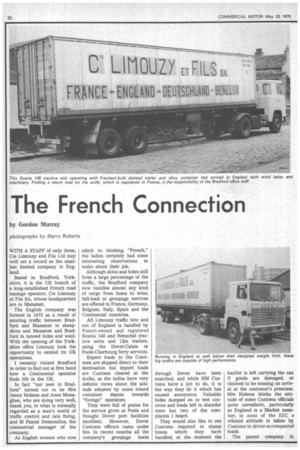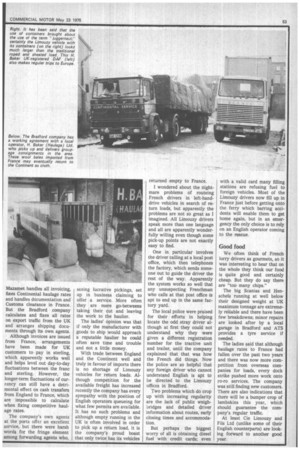The French Connection
Page 56

Page 57

If you've noticed an error in this article please click here to report it so we can fix it.
by Gordon Murray
photographs by Harry Roberts WITH A STAFF of only three, Cie Limouzy and Fils Ltd may well set a record as the smallest limited company in England.
Based in Bradford, Yorkshire, it is the UK branch of a long-established French road haulage operator, Cie Limouzy et FiLs SA, whose headquarters are in Mazamet.
The English company was formed in 1972 as a result of existing traffic between Bradford and Mazamet in sheepskins and Mazamet and Bradford in tanned hides and wool. With the opening of the Yorkshire office Limouzy took the opportunity to extend its UK operations.
I recently visited Bradford in order to find out at first hand how a Continental operator finds life in the UK.
In fact "our men in Bradford" turned out to be Mrs 'Jenny Holmes and Anne Monaghan, who are doing very well, thank you, in what is normally regarded as a man's world of traffic control and rate fixing, and M Pascal Desmoulins, the commercial manager of the company.
As English women who now admit to thinking "French," the ladies certainly had some interesting observations to make about their job.
Although skins and hides still form a large percentage of the traffic, the Bradford company now handles almost any kind of cargo from boats to wine; full-load or groupage services are offered to France, Germany, Belgium, Italy, Spain and the Continental countries, All Limouzy traffic into and out of England is handled by French-owned and registered Scania 140 and Henschel tractive units and 12m trailers, using the Dover-Calais or Poole-Cherbourg ferry services.
Export loads to the Continent are shipped direct to their destination but import loads are Customs cleared at the docks, as the ladies have very definite views about the attitude adopted by some inland container depots towards "foreign" operators.
They were full of praise for the service given at Poole and thought Dover port facilities excellent. However, Dover Customs officers came under fire. In recent months all the company's groupage loads through Dover have been searched, and while HM Customs have a job to do, it is the way they do it which has caused annoyance. Valuable hides dumped on to wet concrete and loads left in disorder were but two of the complaints I heard.
They would also like to see Customs required to stamp boxes which they have handled; at the moment the haulier is left carrying the can if goods are damaged, or claimed to be missing on arrival at the customer's premises. Mrs Holmes thinks the attitude of some Customs officials quite unrealistic, particularly as England is a Market member; in most of the EEC a relaxed attitude is taken by Customs to driver-accompanied loads.
The parent company in Mazamet handles all invoicing, fixes Continental haulage rates and handles documentation and Customs clearance in France. But the Bradford company calculates and fixes all rates on export traffic from the UK and arranges shipping documents through its own agents.
Although invoices are issued from France, arrangements have been made for UK customers to pay in sterling, which apparently works well and helps level out day-to-day fluctuations between the franc and sterling. However, the longer-term fluctuations of currency can still have a detrimental effect on cash transfers from England to France, which are impossible to calculate when fixing competitive haulage rates.
The company's own agents at the ports offer an excellent service, but there were harsh words for the fringe element among forwarding agents who, seeing lucrative pickings, set up in business claiming to offer a service. More often they are mere go-betweens taking their cut and leaving the work to the haulier.
The ladies' opinion was that if only the manufacturer with goods to ship would approach a reputable haulier he could often save time and trouble and not a little money.
With trade between England and the Continent well and truly in favour of imports there is no shortage of Limouzy vehicles for return loads. Although competition for the available freight has increased recently the company has every sympathy with the position of English operators queueing for what few permits are available. It has no such problems and although empty running in the UK is often involved in order to pick up a return load, it is the company's proud boast that only twice has its vehicles returned empty to France.
I wondered about the nightmare problems of routeing French drivers in left-handdrive vehicles in search of return loads, but apparently the problems are not so great as I imagined. All Limouzy drivers speak more than one language and all are apparently wonderfully willing even though some pick-up points are not exactly easy to find.
One in particular involves the driver calling at a local post office, which then telephones the factory, which sends someone out to guide the driver the rest of the way. Apparently the system works so well that any unsuspecting Frenchman who calls at that post office Is apt to end up in the same factory yard.
The local police were praised for their efforts in helping locate the odd stray driver although at first they could not understand why they were given a different registration number for the tractive unit and trailer, until the company explained that that was how the French did things. Now the police are so helpful that any foreign driver who cannot understand English is apt to be directed to the Limouzy offices in Bradford.
Two problems which do crop up with increasing regularity are the lack of public weighbridges and detailed driver information about routes, early closing times and accommodation.
But perhaps the biggest worry of all is obtaining diesel fuel with credit cards; even with a valid card many filling stations are refusing fuel to foreign vehicles. Most of the Limouzy drivers now fill up in France just before getting onto the ferry which barring accidents will enable them to get home again, but in an emergency the only choice is to rely on an English operator coming to the rescue.
Good food
We often think of French lorry drivers as gourmets, so it was interesting to hear that on the whole they think our food is quite good and certainly cheap. But they do say there are "too many chips.'' The big Scanias and Henschels running at well below their designed weight at UK maximum tonnage are extremely reliable and there have been few breakdowns; minor repairs are looked after by a local garage in Bradford and ATS provides a tyre service if needed.
The ladies said that although haulage rates to France had fallen over the past two years and there was now more competition from overseas companies for loads, every dock strike pushed more work onto ro-ro services. The company was still finding new customers. There are also indications that there will be a bumper crop of lambskins this year, which should guarantee the company's regular traffic.
At least Cie Limouzy and Fils Ltd (unlike some of their English counterparts) are looking forward to another good year.






























































































